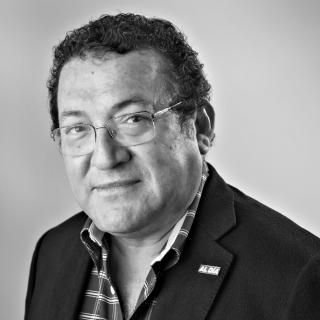
A Cuban poet in New York
In his newly-published book of poetry, "In case I die tomorrow," Albor Ruiz gives voice to his journeys from his hometown of Cárdenas, Cuba, to the streets of…
José Martí was the 19th century’s first, and, if I’m not mistaken, Federico García Lorca followed in the 20th century.
There will thus be hundreds of anonymous men of letters, pilgrims of the Earth, in penitent travel to the great “Byzantium of the West,” who arrived at this great crossroads of civilizations of the world, in the center of Times Square, or Brooklyn, Harlem, Queens, or West Side Manhattan, in New York City.
Attracted by the luster of the name – “The City of New York”– and perhaps by their unintended, obscure desire to travel to this distant place to lick their wounds alone, to savor their troubles slowly - far from their impossible loves, or the disappointments of their early years.
Or, they are simply launched into the romantic adventures of leaving behind prosaic realities, believing instead in the knightly deeds of fiction books, and begin the march, "lanza en ristre," towards the battles yet to be fought in the universe.
New York has seen them arrive, and it has seen them leave – most of them to die somewhere else.
Die much faster in the firing squads of the Spanish Civil War, like Lorca; or to the battlefields of Cuba, as was Martí’s choice.
There have been, howver, other species of poets, born in Cuba and bred in the U.S.
They entrenched themselves here; they have been almost unknown loners who, with the power of their words, survived the fierce winters on the streets of Manhattan, and the suffocating summers inside tiny, poorly ventilated apartments in the Bronx.
Sad birds of the tropics who lowered their wings here, and who have accompanied us for many years - for so long that their friends have forgotten them, and almost nobody remembers that they are still here, hanging on in the cage of this great city, still very much alive, and flapping once in while.
Surely we will all remember them only when we finally receive the news that they hung up their beaks, eventually putting down for ever their pens.
Albor Ruiz, the intelligent eagle that he is, decided to take revenge in advance of us all, gathering those loose pages of secret poems, written by him one by one over the years, almost like a secret memoir, which he wrote undoubtedly for his own joy, or perhaps to show only to his most trusted friends.
RELATED CONTENT
He ultimately decided to assemble them in a book of poems, one he must've kept for years in a drawer in his New York apartment, and which he has finally made public under the solid and incisive title: “In case I die tomorrow.”
“Ruminations,” “Absences,” and moments of “Existing” are the three chapters of this poetry book, just 62 pages long, which has allowed this New York journalist to take a break from his constant firing from his invincible journalistic trench — the same trench for which he was hired as a precise sniper, and star columnist, by the New York Daily News, where he became the first Latino writer on its editorial board.
Nowadays, Albor writes for AL DÍA News Media, finally tying up his ship on a more familiar dock.
He is still glued to the trigger of his unwavering convictions, those that his detractors judge as the mere delirious opinions of a 78-year-old.
Those who dare to read his poetry, however, will realize that the delirium is real.
It is all a gentle spring of rhymes, "jíbara" with no remedy, definitely not authorized by the Royal Academy of the Language in Madrid, free writing as if he were doing it in the risqué English of New York.
But tenderly, as tender is this is a man who had the courage to write it in his native language, with Castilian gentleness, not with the abruptness of his journalistic opinions he gladly writes, with different kind of pleasure, in the much more curt English language.
He is a native of Cárdenas, East of Varadero, on the island of Cuba, the place where he aspires to rest, as he warns in the final verse of his collection of poems, "Por si muero mañana …”:
"Sepan todos que Cuba me reclama..." ("Everyone better know that Cuba is claiming me...")












LEAVE A COMMENT: